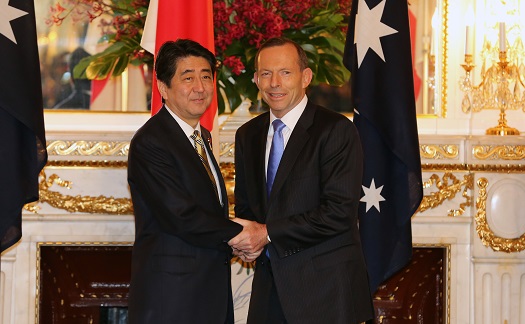The Japan-Australia Economic Partnership Agreement (JAEPA) comes into effect as of today. Prime Minister Tony Abbott and Japanese Prime Minister Shinzo Abe said the deal was the ‘most significant bilateral economic agreement’ made in more than 50 years.

Shinzo Abe and Tony Abbott shake hands after signing free trade agreement (AFP: Mark Graham)
‘The prime ministers look forward to Australian and Japanese businesses working together to make the most of the opportunities provided by JAEPA,’ they said in a joint statement.
This is the first free trade deal Japan has made with a major exporting nation and will lead to reduced or eliminated tariffs for a range of agricultural commodities, including beef, prawns, lobsters, asparagus, cherries, grapes, macadamia nuts and almonds.
Australian beef, with exports to Japan last year worth $1.4 billion, will be a major beneficiary with the 38.5 per cent tariff to be halved over 15 years, with heavy front-end loading, including an 8 per cent cut in the first year.
The major outcomes for the export of Beef include:
For frozen beef, the tariff facing Australia will fall from 38.5 per cent to 30.5 per cent on day one of the agreement, giving an immediate competitive advantage, and then phase to 19.5 per cent over 18 years.
- For fresh beef, the tariff facing Australia will fall from 38.5 per cent to 32.5 per cent on day one, giving an immediate competitive advantage, and then phase to 23.5 per cent over 15 years.
- Australia (unlike any other country) will never again be subjected to the automatic 50 per cent “global snapback” tariff.
- Japan will have the ability to apply a discretionary safeguard and raise the tariff back to 38.5 per cent if the import volume exceeds Australia-specific triggers within a given year.
- The starting triggers are set well above current trade levels (14.5 per cent above 2013 exports for frozen beef and 12 per cent above 2013 exports for fresh beef) and rise each year for ten years before being reviewed.
Japan is also a vital market for Australian beef offal and beef products, with exports of $166 million in offal and over $15 million in preserved and prepared beef in 2013-14.
- Beef offal tariffs of up to 50 per cent will be reduced immediately by 40 per cent under a growing quota large enough at the start to cover most of Australia’s beef offal exports.
- Tariffs on prepared and preserved beef meat will be reduced immediately by between 20 and 40 per cent under a growing quota large enough at the start to cover existing trade.
- The beef safeguard will not apply to beef offal or preserved and prepared beef.
Under JAEPA, the market access outcome on beef will be reviewed providing a framework for further liberalisation and protection against competitors securing a better deal. This includes:
- A review triggered immediately if Japan provides one of our competitors a better deal on beef, aimed at providing Australia equivalent treatment;
- An automatic review aimed at improving access five years after entry into force; and
- An additional review of the beef safeguard mechanisms after ten years to consider abolishing the safeguard or increasing the safeguard trigger levels.
The other key agriculture outcomes of the JAEPA include:
Wine: Elimination of the 15 per cent tariff on bottled wine over seven years and immediate elimination of the tariff on bulk wine.
Dairy: Immediate duty-free quotas for Australian cheese, immediate duty-free access for the growing trade in milk protein concentrates, lactose and casein and new opportunities for ice-cream and frozen yoghurt.
Seafood: Immediate elimination of tariffs up to 9.6 per cent on lobsters, prawns, oysters, crabs and abalone and elimination of tariffs on tuna and Atlantic salmon over 10 years.
Horticulture: Immediate elimination of tariffs up to 6 per cent on asparagus, macadamia nuts, almonds, mangoes, and many other products. High tariffs on walnuts (10 per cent) and onions (8.5 per cent) will be eliminated in five years, while tariffs on apples (17.5 per cent) will be eliminated over 10 years. Taking advantage of counter-seasonal production, tariffs on oranges (16 per cent), table grapes (7.8 per cent) and cherries (8.5 per cent) will be eliminated during our exporting season.
Grains: Immediate duty-free and quota free access for Australian wheat and barley for animal feed and streamlined export arrangements for some Australian wheat varieties. Elimination of the 21.3 per cent tariff on wheat gluten and tariffs on canola and vegetable oils over up to 10 years.
Sugar: Immediate tariff elimination and reduced levies for international standard raw sugar.
Processed Foods: Tariffs up to 29.8 per cent on juice, canned fruit, soup, jam, peanut butter, tea and pet food will be eliminated and Australia will receive preferential access for chocolate, honey, biscuits, cakes and breakfast cereals.
Source: Department of Foreign Affairs and Trade website



